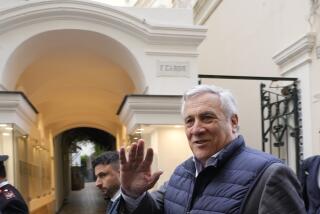Major Powers Agree on Anti-Terror Principles
- Share via
PARIS — Eight of the world’s major powers agreed to a 25-point program of principles for fighting terrorism, including the drafting of a new international convention on terrorist bombings.
Atty. Gen. Janet Reno called it “incredible” that no existing international convention outlaws terrorist bomb attacks on targets such as ground transportation, although there are international rules covering attacks on air travel and shipping.
The proposed new convention would attempt to plug these gaps and try to make arrests and extraditions easier. The United States will probably host the drafting meetings this fall, officials said Tuesday. Washington wants to move swiftly, to take advantage of a general rise in public support for tougher law-and-order measures stemming from the still-unexplained explosion of TWA Flight 800 and the blast at Centennial Olympic Park in Atlanta.
“We really want to move things forward,” said a U.S. official participating in the conference. “We didn’t want to leave here with a bunch of wonderful principles and rhetoric hanging in the air.”
But notably absent from Tuesday’s ministerial conference was any talk of the “strong sanctions” against countries such as Iran, Iraq, Sudan and Libya that President Clinton called for Sunday in remarks to a veterans convention in New Orleans.
The U.S. has long wanted to economically punish countries it believes sponsor terrorism. But European officials made it clear before Tuesday’s meeting that they would reject any American initiative to tighten the economic noose on individual countries.
Since 1992, the European Union has, for example, practiced what it calls a “critical dialogue” with Iran, trying to maintain diplomatic contacts and allow trade. Europe argues that such a policy is more likely to achieve positive results than American-style isolation.
Clearly outnumbered, the U.S. delegation did not even bring up the idea of sanctions in Paris. “We realize that our friends and partners have questions” about the concept of sanctions, said State Department undersecretary for political affairs Peter Tarnoff, who was filling in for Secretary of State Warren Christopher. Christopher remained in Washington on Tuesday to meet with Egyptian President Hosni Mubarak.
In the interest of presenting a tough, united front to international terrorists, all conference participants Tuesday downplayed differences between the U.S. and Europe on sanctions.
“That was not the angle from which we looked at terrorism today,” French Foreign Minister Herve de Charette said, adding that the main point was to “look at concrete, practical measures we could take so that we will be more effective tomorrow than we are today.”
Clinton, speaking in Washington at a news conference with Mubarak, defended the U.S. view that nations that support terrorism must be quarantined economically and diplomatically. He noted that the position is unpopular with many states--including Egypt--but said, “I believe in the end that these countries will come around to our position.”
But Mubarak argued that it was unfair to impose sanctions against an entire nation for the actions of terror groups operating from its soil. He said that such indiscriminate punishment merely fuels future terrorist actions. “If we are going to punish the whole country in any place because of terrorism, the people will get upset, get furious,” Mubarak said. “So we’d like to select a few who [are] responsible. . . .”
The 25-point program unveiled at the end of the Paris conference contained few items concrete enough to implement immediately, and some independent observers said they had hoped for more.
“I don’t think this conference has come out with convincing results,” said Yves Bonnet, former head of the French secret services, interviewed on the main French radio station after the conference. “The only major element was the presence of Russia and their secret services.”
The program includes general agreement on stricter border controls, a search for legal ways to track terrorists via the Internet and investigations of charitable, humanitarian and other organizations that might be used as fronts for terrorism. The ministers did not specify which groups these might be. Other elements include tighter international standards for bomb detection at airports and standardization of investigative tools that police can use to hunt down bombers.
American officials said, for instance, that the U.S. had won agreement of the seven other countries at the conference to improve the way their auto makers stamp vehicle identification numbers on cars. Such numbers are essential in analyzing metal fragments left after a car bombing.
American law enforcement officials complain that no other country now stamps its cars in as many places as does the U.S. If all the countries present Tuesday follow through on their pledges to upgrade this procedure, officials said, 90% of cars produced in the world could be traced, even when blown to bits.
Officials also said the U.S. had won preliminary acceptance of an FBI plan to develop an international forensic-science database, which would pool detailed information about terrorists--everything from fingerprints to DNA. Washington now shares such information only with its close allies.
The eight participating nations also agreed in principle to share research on explosive-detection methods--tracers that can give explosives a unique chemical “signature”--and to step up domestic controls on the manufacture and sale of explosives.
Britain and the U.S. lead the world in the development of chemical tracers. A recent attempt to force American manufacturers to use the technology failed in Congress, but Clinton on Sunday revived the proposal in his New Orleans speech.
Tuesday’s anti-terrorism conference was proposed by Clinton last month at a Group of 7 meeting in Lyons, France, after a truck bomb killed 19 U.S. airmen in Saudi Arabia. The countries participating in the Lyons and Paris meetings were the U.S., Russia, Britain, France, Italy, Canada, Japan and Germany.
Times staff writers Norman Kempster and Janet Hook in Washington contributed to this report.
More to Read
Sign up for Essential California
The most important California stories and recommendations in your inbox every morning.
You may occasionally receive promotional content from the Los Angeles Times.













